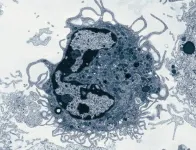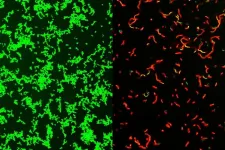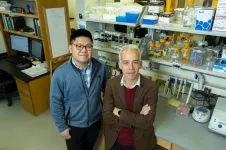(Press-News.org)
A new study published in Science Advances reveals that uncertainties are currently too large to accurately predict exact tipping times for critical Earth system components like the Atlantic Meridional Overturning Circulation (AMOC), polar ice sheets, or tropical rainforests. These tipping events, which might unfold in response to human-caused global warming, are characterized by rapid, irreversible climate changes with potentially catastrophic consequences. However, as the new study shows, predicting when these events will occur is more difficult than previously thought.
Climate scientists from the Technical University of Munich (TUM) and the Potsdam Institute for Climate Impact Research (PIK) have identified three primary sources of uncertainty. First, predictions rely on assumptions regarding the underlying physical mechanisms, as well as regarding future human actions to extrapolate past data into the future. These assumptions can be overly simplistic and lead to significant errors. Second, long-term, direct observations of the climate system are rare and the Earth system components in question may not be suitably represented by the data. Third, historical climate data is incomplete. Huge data gaps, especially for the longer past, and the methods used to fill these gaps can introduce errors in the statistics used to predict possible tipping times.
To illustrate their findings, the authors examined the AMOC, a crucial ocean current system. Previous predictions from historical data suggested a collapse could occur between 2025 and 2095. However, the new study revealed that the uncertainties are so large that these predictions are not reliable. Using different fingerprints and data sets, predicted tipping times for the AMOC ranged from 2050 to 8065 even if the underlying mechanistic assumptions were true. Knowing that the AMOC might tip somewhere within a 6000-year window isn't practically useful, and this large range highlights the complexity and uncertainty involved in such predictions.
The researchers conclude that while the idea of predicting climate tipping points is appealing, the reality is fraught with uncertainties. The current methods and data are not up to the task. “Our research is both a wake-up call and a cautionary tale,” says lead author Maya Ben-Yami. “There are things we still can’t predict, and we need to invest in better data and a more in-depth understanding of the systems in question. The stakes are too high to rely on shaky predictions.”
While the study by Ben-Yami and colleagues shows that we cannot reliably predict tipping events, the possibility of such events cannot be ruled out either. The authors also stress that statistical methods are still very good at telling us which parts of the climate have become more unstable. This includes not only the AMOC, but also the Amazon rainforest and ice sheets. “The large uncertainties imply that we need to be even more cautious than if we were able to precisely estimate a tipping time. We still need to do everything we can to reduce our impact on the climate, first and foremost by cutting greenhouse gas emissions. Even if we can’t predict tipping times, the probability for key Earth system components to tip still increases with every tenth of a degree of warming,” concludes co-author Niklas Boers.
_
This research is part of the ClimTip project, which aims to enhance our understanding of climate tipping points.
For additional information or to schedule an interview with the researchers, please contact Niklas Boers at boers@pik-potsdam.de.
More details, including a copy of the paper, can be found online at the Science Advances press package at https://www.eurekalert.org/press/vancepak/. You will need your user ID and password to access this information.
_
Reference:
M. Ben-Yami, A. Morr, S. Bathiany, N. Boers: Uncertainties too large to predict tipping times of major Earth system components from historical data, Science Advances (2024).
The article will be made available at https://www.science.org/doi/10.1126/sciadv.adl4841 once it is published.
END
Researchers at the University of Liège (Belgium) have discovered a new population of macrophages, important innate immune cells that populate the lungs after injury caused by respiratory viruses. These macrophages are instrumental in repairing the pulmonary alveoli. This groundbreaking discovery promises to revolutionize our understanding of the post-infectious immune response and opens the door to new regenerative therapies.
Respiratory viruses, typically causing mild illness, can have more serious consequences, as shown during the Covid-19 pandemic, including severe cases requiring hospitalization and the chronic sequelae of "long Covid." These conditions ...
While the moon lacks any breathable air, it does host a barely-there atmosphere. Since the 1980s, astronomers have observed a very thin layer of atoms bouncing over the moon’s surface. This delicate atmosphere — technically known as an “exosphere” — is likely a product of some kind of space weathering. But exactly what those processes might be has been difficult to pin down with any certainty.
Now, scientists at MIT and the University of Chicago say they have identified the main process that formed the moon’s atmosphere and continues to sustain ...
More than 1 in 5 Californians who are impacted by climate events report negative effects on their mental health, with young, white women and those who’ve experienced property damage being especially affected.
####
Article URL: https://journals.plos.org/climate/article?id=10.1371/journal.pclm.0000387
Article Title: Exposure to climate events and mental health: Risk and protective factors from the California Health Interview Survey
Author Countries: United States
Funding: The authors received no specific funding for this work. END ...
Researchers at Washington University School of Medicine in St. Louis have developed a novel compound that effectively clears bacterial infections in mice, including those that can result in rare but potentially fatal “flesh-eating” illnesses. The compound could be the first of an entirely new class of antibiotics, and a gift to clinicians seeking more effective treatments against bacteria that can’t be tamed easily with current antibiotics.
The research is published Aug. 2 in Science Advances.
The compound targets gram-positive bacteria, which can cause drug-resistant staph infections, toxic shock syndrome and ...
We should think twice before calling 911 for people experiencing a mental health crisis, advocated Harvard-trained psychiatrist Dr. Rupinder Legha, who describes the potential risks of relying on emergency services in the US for mental health crisis management.
###
Article URL: https://journals.plos.org/mentalhealth/article?id=10.1371/journal.pmen.0000084
Article Title: Reconsidering calling 911: Is it time to set a new standard for mental health crisis response?
Author Countries: United States
Funding: The authors received no specific funding for this work. END ...
The process by which phages—viruses that infect and replicate within bacteria—enter cells has been studied for over 50 years. In a new study, researchers from the University of Illinois Urbana-Champaign and Texas A&M University have used cutting-edge techniques to look at this process at the level of a single cell.
“The field of phage biology has seen an explosion over the last decade because more researchers are realizing the significance of phages in ecology, evolution, and biotechnology,” said Ido Golding (CAIM/IGOH), a professor of physics. “This work is unique ...
In the months that followed NASA’s Double Asteroid Redirection Test (DART) mission, which sent a spacecraft to intentionally collide with an asteroid moonlet, the science team verified that kinetic impact was a viable deflection technique, proving one effective method of preventing future asteroid strikes on Earth.
Since then, researchers have continued studying data collected from the successful experiment, focusing specifically on surface features of the binary asteroid system, composed of moonlet Dimorphos and parent asteroid Didymos.
In recently published papers in Nature Communications, the team explored the geology of the asteroid system encountered in 2022 to characterize its ...
When an individual visits their doctor, they aren’t supposed to keep secrets. Unless patients are forthcoming about their symptoms, behaviors, and health-related beliefs, it’s hard for healthcare professionals to effectively diagnose and treat illnesses—or to advise and educate patients about how to take better care of themselves in the future.
There’s only one problem: new research from Stevens Institute of Technology shows that many people believe they may be judged if they share mistaken beliefs with their care team—and that doctors really do take strongly negative views of patients who disclose incorrect ...
East Hanover, NJ – August 2, 2024 – Following significant gains since the post-pandemic lockdown, employment rates for people with disabilities have plateaued, remaining near historic high levels over the past year despite the Federal Reserve’s efforts to slow the economy, according to today’s National Trends in Disability Employment – semi-monthly update (nTIDE) issued by Kessler Foundation and the University of New Hampshire’s Institute on Disability (UNH-IOD).
Year-to-Year nTIDE Numbers (comparing July 2023 to July 2024)
Based on data from the U.S. Bureau of Labor Statistics ...
□ DGIST (President Lee Kunwoo) Department of Brain Sciences Professor Lee Kwang and his team have discovered a new correlation between neural signaling in the brain and dopamine signaling in the striatum. The human brain requires fast neural signal processing in a short period of less than a second. Dopamine is known to have the strongest effect on brain neural signals, but the research team’s newly developed “optical neural chip-based multiple brain signal monitoring technology” shows that changes in dopamine signals within the physiological range do not affect brain neural signal ...






